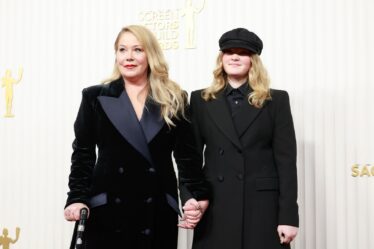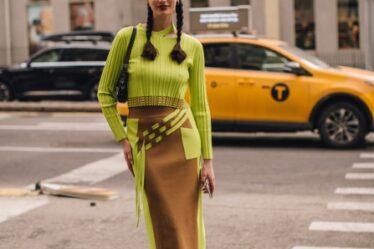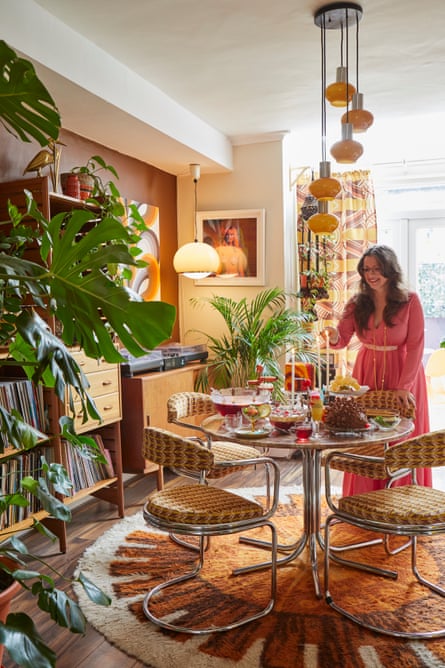
From the day Estelle Bilson moved into the three-bedroom house in south Manchester that she shares with her husband, Steve, their seven-year-old son and their black cat, Elvis, there was little doubt about the direction the interiors would take. Estelle is a dealer in decorative items, homewares and furniture from the 1970s, and has spent her adult life tracking down the gems of design from that decade. By 2015, when she moved in to live with Steve in his “slightly studenty” Edwardian end-of-terrace that had once been a corner shop, she had amassed enough chrome, smoked glass and teak to fill a house. Fortunately, Steve, a sound and lighting engineer who already owned a G-Plan sideboard, also liked vintage and was totally on board with her vision.
Today Estelle and Steve’s home, which they also rent out as a location house, is a colourful imagining of glamorous 1970s living. Here giant monstera plants sit on heavily patterned shag-pile rugs and the mass-printed artwork of Vladimir Tretchikoff graces the walls. Displays of chunky West German pottery and bubbled blue Empoli glass adorn Ladderax shelving, while walls are painted orange or brown, or zhuzhed up with psychedelic wallpaper or giant groovy stickers. In the bathroom, bronze mosaic mirror tiles, glitter balls, an ombré suite and gold dolphin fixtures create an ambience that brings to mind a louche disco. Much of what they have accumulated has been had for a song, sourced from eBay, Facebook Marketplace or car boot sales, while back in the late-90s and early noughties Estelle would often find things for free, discarded in skips or left out on the street, as people purged their homes of what was no longer fashionable.
Despite the prevalence of 70s style, Estelle is keen to stress that this is a family home, not a museum. “We don’t have any woodchip walls or Artex ceilings; I don’t want to live like that,” she says. “This is a fantasy inspired by sexy advertising shoots from that decade’s magazines. It’s my interpretation, it’s not supposed to be accurate. It’s just original pieces that I love and have put in my home, which I’ve decorated how I like. We still have a smart TV. We have mobile phones, laptops, a gaming console and I don’t use a twin tub. It’s very much vintage style, not vintage values.”
Estelle, who was herself born in the 70s, has always been drawn to the aesthetic of that era. “The colours, the patterns, the quality of build… it’s always really appealed to me. I don’t know why, it just sings to my soul,” she says. With a father who was a cabinet maker and antiques dealer, she grew up with furniture and design on her radar, but her parents’ taste for William Morris wallpaper and heavy dark-wood antiques wasn’t for her. She remembers though, as a child, admiring her paternal grandparents’ matching teak furniture, while her other grandmother had “Murano glass animals, sunburst clocks and a brown and orange striped bouclé sofa, which was quite fabulous”.
Having sold on much of the furniture she arrived with, most of the key pieces in Estelle’s home today were bought online. In the living room, the large, rectangular rya rug, cluster pendant light with Murano glass shades and Foscarini Fields metal wall light were all found on eBay. This was during the first phase of decorating, when they had just painted the living room wall in quintessentially 1970s orange, and the colour was clearly still in mind. “The room wasn’t going to be that orange,” she says. “It ended up a lot more so than we anticipated but, actually, I love the orange on orange on orange.”
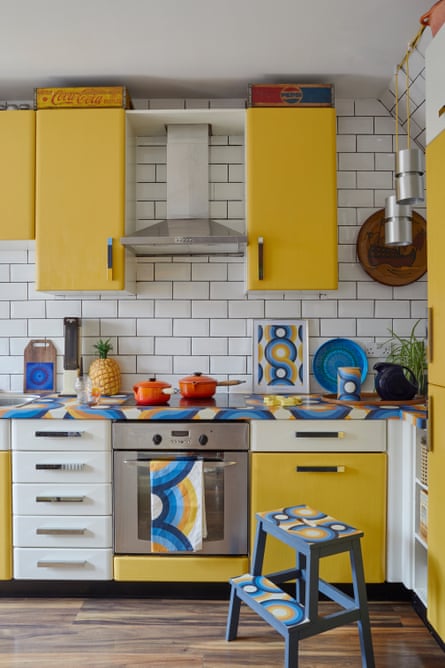
Estelle bought the vintage Heal’s Volution fabric from a dealer on Instagram, and she then stretch-framed it to create a bold piece of wall art. The bentwood ply room-divider was purchased live on TV from a contributor during the filming of BBC1’s The Bidding Room, where Estelle is an expert dealer. “None of the other dealers wanted it, but I think it’s stunning,” she says. “It adds a really nice focal point to the room.”
The green G Plan sofa was a later purchase, for £100 on Facebook Marketplace, which is where she also sourced the swivel glass coffee table (£40) and the Keracolor TV (£120). The Keracolor is a local icon, designed by Arthur Bracegirdle and manufactured in Northwich, Cheshire, between 1970 and 1977. Estelle’s work, but hasn’t been upgraded for watching Netflix and, as she says about many of the pieces in her home, “is more for the style than the substance”.
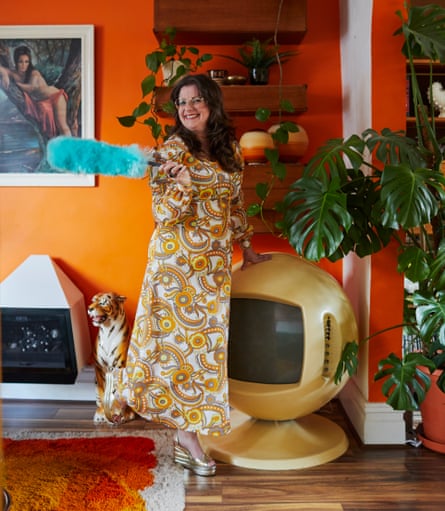
Estelle has two favourite pieces: one is her Marcel Breuer Long Chair, designed in 1936 but popular in the 70s due to its re-release around that time. Estelle’s came from eBay in need of some TLC – her father restored the woodwork, while she reupholstered it. Her other favourite is the circular brown and orange sunshine rya rug in the dining room. Estelle had one of these in her bedroom as a child, but it was thrown out while she was at school one day when her parents decided it was too worn. It was almost three decades later that she spotted this one in the home of a fellow vintage enthusiast and also a dealer on Instagram. The pair bonded over their love for the design, becoming friends, and when they redecorated, she presented the rug to Estelle as a gift. It turned out to be the missing piece that pulled everything in the room together and confirmed to Estelle that her fearless decision to paint the walls brown had been the right one.
“I know not everyone would choose to live the way we do, to buy secondhand and have such colourful interiors, but my house makes me smile, it makes me happy and it’s fun,” she says. “I don’t decorate for anyone else, I decorate for us – and I think there’s a lot to be said for the positive effect that colour has on your mental wellbeing. Our house honestly brings us joy.”
The 70s House by Estelle Bilson is published by Kyle Octopus at £20. For more information, visit 70shousemanchester.com

